Select Language
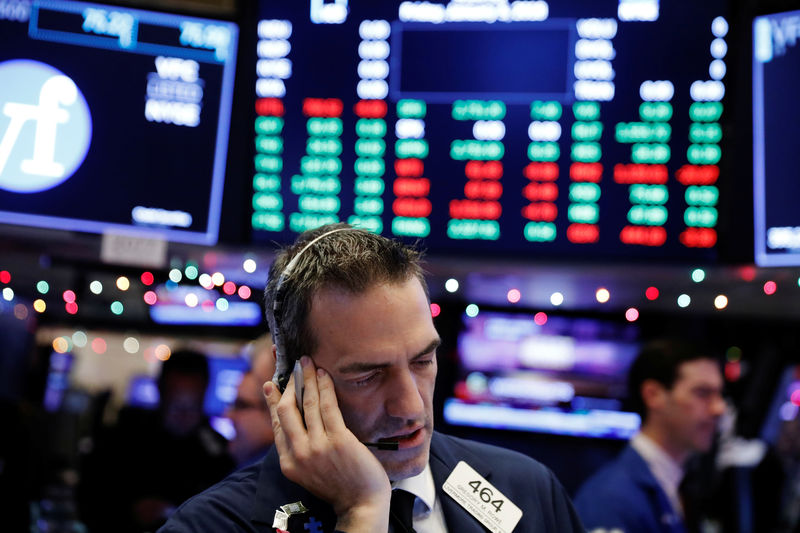
U.S. stock futures were largely unchanged Thursday evening following a Wall Street rally driven by a new trade deal framework with the UK, while investors looked ahead for further agreements, including one with China.
S&P 500 Futures inched 0.1% lower to 5,677.0 points, while Nasdaq 100 Futures were largely muted at 20,135.75 points by 20:12 ET (00:12 GMT). Dow Jones Futures fell 0.2% to 41,397.0 points.
Wall St gains on US-UK trade deal framework; China agreement eyed
In the regular trading session on Thursday, the Dow Jones Industrial Average closed 0.6% higher, the S&P 500 index also climbed 0.6%, while the NASDAQ Composite jumped 1.1%
President Donald Trump on Thursday signed a framework for a trade deal with the United Kingdom, raising hopes that the Trump administration’s chaotic trade policies could soon be settling down.
Under the deal, the 10% tariff that was imposed on goods imported from the UK remains in place, while the UK agreed to lower its tariffs to 1.8% from 5.1% and provide further access to U.S. goods.
Moreover, steel and aluminum imports to the U.S. would be exempt from Trump’s 25% levy.
“The deal enables the President to offer the sense of flexibility that financial markets are craving. The reaction – higher equity prices, a stronger dollar, higher Treasury yields – shows that it has had the desired effect,” ING analysts said in a note.
However, analysts were sceptical that the UK’s deal would herald a much broader easing in trade tensions.
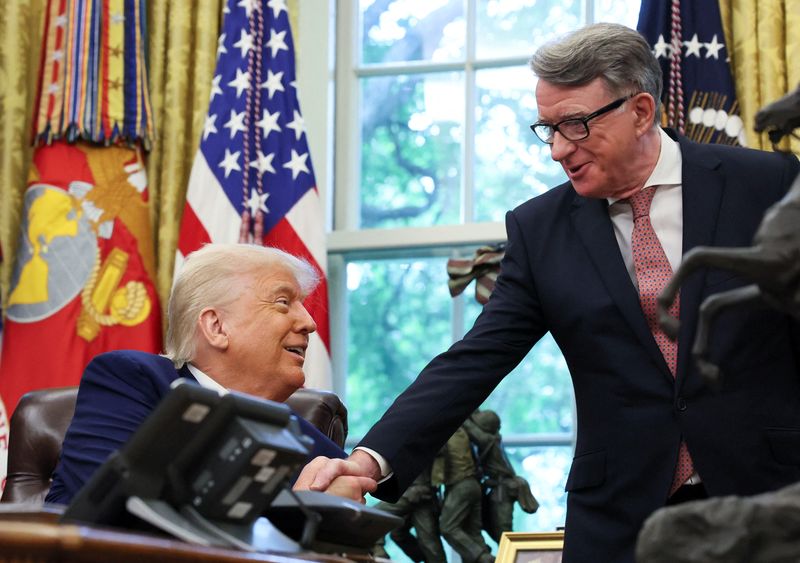
President Donald Trump confirmed a trade deal with the United Kingdom on Thursday. It is the first deal since reciprocal tariffs were announced on April 2nd. Importantly, the 10% base tariff will remain for the UK, providing a glimpse of a possible roadmap for future deals.
Trump and UK Prime Minister Sir Keir Starmer confirmed the deal during a phone call broadcast live. Trump highlighted that the new deal will raise $6 billion in External Revenue from the agreement and $5 billion in new export opportunities.
The two sides also announced the creation of an Aluminum and Steel trading zone and a secure pharmaceutical supply chain.
“Today is an incredible day for America as we deliver our first Fair, Open, and Reciprocal Trade Deal — Something our past Presidents never cared about,” Trump stated. “Together with our strong Ally, the United Kingdom, we have reached the first, historic Trade Deal since Liberation Day.”
As part of the deal, the UK has agreed to a $10 billion Boeing procurement deal. Shares of Boeing Co (NYSE:BA) rose 3% intraday.
The deal will provide a 10% tariff on a quota of 100,000 UK auto exports to the U.S. When answering a question, the U.S. President said there is "a good commercial for Rolls-Royce (OTC:RYCEY)." Rolls-Royce shares closed over 3% higher in today’s session.
U.S. Secretary of Agriculture Brooke Rollins said the deal will “exponentially increase” U.S. beef exports to the UK.
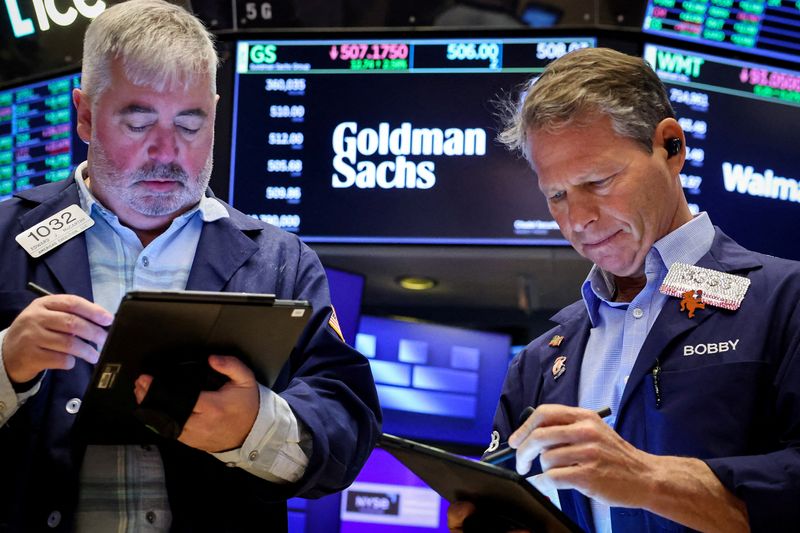
U.S. stock futures climb, bolstered by media reports that the White House will soon announce a trade agreement with the U.K. The Federal Reserve leaves interest rates steady, but Fed Chair Jerome Powell warns that aggressive U.S. tariffs are "likely" fueling inflation and unemployment risks. Carmaker Toyota warns that its annual operating profit could fall due to the levies.
1. Futures rise
U.S. stock futures tick higher, as investors gauge reports of an upcoming trade deal between the U.S. and Britain and assess interest rate commentary from Federal Reserve Chair Jerome Powell.
By 03:46 ET (07:46 GMT), the Dow futures contract had jumped by 221 points, or 0.5%, S&P 500 futures had gained 41 points, or 0.7%, and Nasdaq 100 futures had risen by 202 points, or 1.0%.
The main averages advanced on Wednesday, buoyed by reports that U.S. export restrictions on artificial intelligence chips would be somewhat loosened. Semiconductor stock rallied late in the session, following a bout of volatility in the build-up to the Fed’s latest rate decision.
In individual stocks, Walt Disney (NYSE:DIS) shares rose, pulling up the blue-chip Dow Jones Industrial Average, after the entertainment behemoth’s second-quarter earnings and outlook topped estimates despite ongoing worries over economic uncertainty.
2. U.S. to announce trade deal with Britain - reports
President Donald Trump is anticipated to reveal the outlines of a trade agreement with the U.K. on Thursday, according to media reports.
The potential announcement, which would be the first trade-related agreement secured by the White House since it slapped tariffs on friends and foes alike, is expected to be a framework of a deal with tariff adjustments, the Wall Street Journal reported.
Writing on social media on Wednesday, Trump said the statement will revolve around a "MAJOR TRADE DEAL WITH REPRESENTATIVES OF A BIG, AND HIGHLY RESPECTED, COUNTRY", adding that it would be "THE FIRST OF MANY".
Details of the agreement were not immediately clear, the New York Times (NYSE:NYT) said, adding that both countries have discussed bringing down British tariffs on U.S. cars and farm products and scrapping British duties on U.S. tech firms.
White House officials have been pushing to notch trade deals with dozens of countries during a 90-day delay to Trump’s heightened "reciprocal" tariffs. However, despite the postponement, several tariffs are still in place, including universal 10% levies and other trade taxes on items like steel, aluminum and autos.
3. Fed warns of inflation, unemployment risks
The rate-setting Federal Open Market Committee left borrowing costs unchanged on Wednesday, as it flagged concerns that inflation and unemployment risks had climbed.
In a post-meeting press conference, Fed Chair Jerome Powell argued that Trump’s aggressive tariff agenda is "likely" to lead to push prices, weigh on job growth, and dent the broader the economy. Taken together, the outlook resembles a period of so-called "stagflation" in the world’s largest economy.
At the moment, most of Trump’s elevated "reciprocal" levies -- not including eye-watering duties of at least 145% on Chinese imports -- have been delayed until July. But Powell’s comments suggest that Fed officials remain wary that the tariffs could snap back into place later this year.
Heading into its latest rate decision, the Fed had been grappling with relatively mixed data. U.S. gross domestic product, a key gauge of growth, contracted in the first quarter, although other indicators showed that consumer spending and the labor market remain resilient.
Crucially, the Fed’s most recent statement "gave no hint" that it was considering more cuts to rates, said Paul Ashworth, Chief North America Economist at Capital Economics. Borrowing costs have stood at a target range of 4.25% to 4.5% since December.
Powell also noted that it was "not at all clear" what the appropriate response for monetary policy" should be at this time given the uncertainty around the tariffs.
4. Toyota warns of tariff hit
Japanese carmaker Toyota Motor (NYSE:TM) has warned that its profits could drop by a fifth in its current financial year due in large part to Trump’s tariffs.
The world’s best-selling auto manufacturer said it now projects that annual operating income will come in at 3.8 trillion yen ($26 billion), down from 4.8 trillion yen in its prior fiscal year.
CEO Koji Sato flagged that the murkiness around the future of the tariffs has made it difficult to plan for them, echoing comments from several other businesses during the latest quarterly earnings season. He noted that whether the tariffs are permanent or not is "not something we can decide".

NEW DELHI/ISLAMABAD (Reuters) -A blast was heard in Pakistan’s eastern city of Lahore on Thursday morning, according to broadcaster Geo TV and a Reuters witness, a day after Indian strikes at multiple locations in the country and fears of an escalation in conflict between the nuclear-armed neighbours.
There was no immediate word on the reason for the blast.
India hit "terrorist infrastructure" in Pakistan in the early hours of Wednesday, two weeks after it accused the Islamic nation of involvement in an attack in Indian Kashmir in which 26 people - mostly Hindu tourists - were killed.
Islamabad had denied the accusation and vowed to retaliate to the missile strikes, also saying it shot down five Indian aircraft. The Indian embassy in Beijing termed reports of fighter jets being shot down as "misinformation".
Pakistan says at least 31 of its civilians were killed and about 50 wounded in the strikes and in cross-border shelling that followed, while India says 13 of its civilians died and 43 were wounded.
The cross-border exchange of fire tapered off slightly overnight, Indian officials said.
India also conducted blackout drills in regions close to its border with Pakistan, including the northern city of Amritsar which houses the Golden Temple revered by Sikhs, in anticipation of retaliation to its strikes.
In Pakistan, meanwhile, most cities restored some normalcy and children returned to school, but in the border province of Punjab, hospitals and civil defence authorities remained on high alert.
Although Pakistan’s federal government has pledged to respond to India’s strikes, Defence Minister Khawaja Muhammad Asif told The New York Times (NYSE:NYT) on Wednesday that Pakistan was ready to de-escalate.
With India saying it would "respond" if Pakistan "responds", global powers have urged a calming of tensions. U.S. President Donald Trump said on Wednesday he hoped the countries could "work it out", adding he "will be there" if he can help.
The relationship between India and Pakistan has been fraught with tension since they gained independence from colonial Britain in 1947, and the countries have fought three wars, two of them over Kashmir.
The current escalation in tensions comes at a precarious time for Pakistan’s $350 billion economy, which is still recovering from an economic crisis that brought it to the brink of defaulting on external debt obligations in 2023 before it secured funding from the International Monetary Fund (IMF).
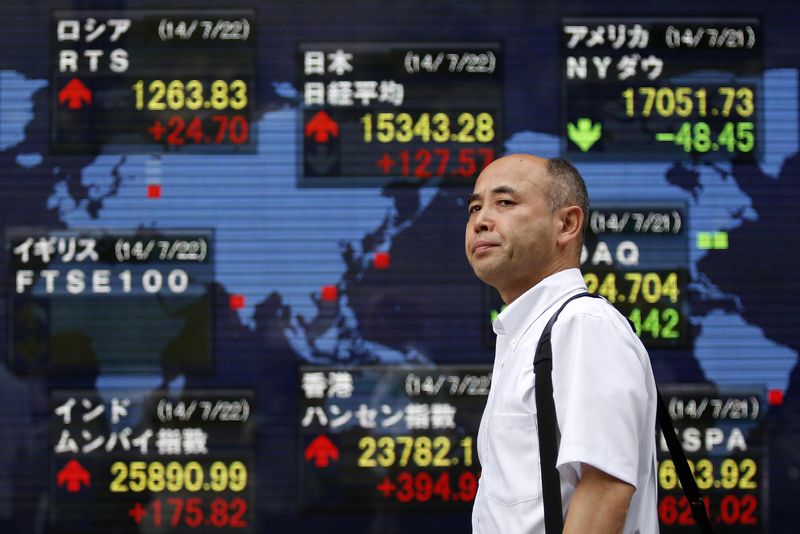
Most Asian stocks rose marginally on Thursday amid increased hopes for a deescalation in U.S. President Donald Trump’s tariff agenda ahead of trade talks between Washington and Beijing later this week.
Regional tech stocks also tracked some gains in their U.S. peers, after reports suggested that the Trump administration was planning to scale back export curbs on advanced artificial intelligence chips.
Asian markets also took a positive lead-in from Wall Street, which was buoyed by tech gains. U.S. stock index futures rose in Asian trade after Trump said he will announce a major trade deal later in the day, with reports suggesting the deal will be with Britain.
S&P 500 Futures added 0.5%, while Nasdaq 100 Futures rose 0.7%. But sentiment towards Wall Street also remained on edge after the Federal Reserve warned of heightened economic and trade uncertainty.
But regional sentiment still remained frail, especially amid heightened military tensions between India and Pakistan, after New Delhi launched strikes against alleged terrorist targets in Pakistan.
Islamabad retaliated with artillery strikes along the border region in Kashmir, with the clash marking some of the worst fighting between the two nuclear armed powers in recent years.
China stocks upbeat, US trade talks in focus
China’s Shanghai Shenzhen CSI 300 and Shanghai Composite indexes rose 0.4% and 0.1%, respectively, on Thursday.
Chinese stocks saw marginal strength after Washington and Beijing confirmed that officials will meet for trade talks in Switzerland this week. While the prospect of trade dialogue did drive some optimism over deescalation in a bitter U.S.-China trade war, it appeared unlikely that a trade deal would be struck soon.
Beijing signaled that the meeting was largely at the U.S.’ request, while Trump said he did not intend to lower his steep 145% tariffs against China before the talks.
Beijing has demanded that the U.S. lower its trade tariffs before any serious trade negotiations can begin– a demand that has been largely rebuked by Trump.
Asia tech rises on hopes of less strict US chip export curbs
Tech-heavy Asian bourses led gains on Thursday. Hong Kong’s Hang Seng index added 0.9%, while Japan’s Nikkei 225 rose 0.4%. South Korea’s KOSPI rose 0.3%.
Tech was boosted chiefly by reports that the U.S. will scale back Biden-era curbs on advanced AI chip exports, which bodes well for U.S.-based chipmakers. But such a move also heralds more business for the Asian companies that supply to U.S. chipmakers.
Regional suppliers of AI major Nvidia– such as Taiwan’s TSMC (TW:2330) and South Korea’s SK Hynix Inc (KS:000660)– rose between 0.5% and 1.5% on Thursday. Japan’s Advantest Corp. (TYO:6857) added 2.8%, while Chinese internet stocks– such as Alibaba (HK:9988) and Tencent Holdings Ltd (HK:0700)– rose on the prospect of being able to source more advanced U.S. chips for their AI ambitions.
Broader Asian markets were mostly positive. Australia’s ASX 200 added 0.2%, although bigger gains were held back by a 3% drop in ANZ Group Holdings Ltd (ASX:ANZ), after the major bank clocked middling first-half earnings.
Westpac Banking Corp (ASX:WBC) also weighed on the ASX with a nearly 5% slide, as it traded ex-dividend.
Futures for India’s Nifty 50 index rose 0.5%, heralding a positive open, with local stocks showing limited reaction to heightened tensions with Pakistan. The Nifty 50 rose about 0.1% on Wednesday.
Singapore’s Straits Times index was an outlier, losing about 0.2%, while Japan’s TOPIX index shed 0.2%.
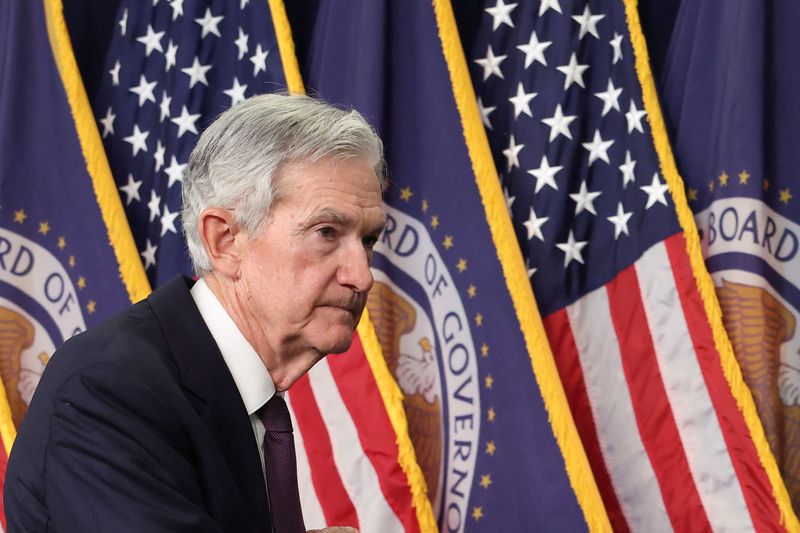
NEW YORK (Reuters) - Federal Reserve Chairman Jerome Powell said on Wednesday that he never seeks to meet with any U.S. president and to the extent he has had such a meeting, it’s because the elected leader sought the interaction.
"I’ve never asked for a meeting with any president and I never will," Powell said at a press conference following the close of the Fed’s policy-setting committee meeting. "There’s never a reason for me to ask for a meeting, it’s always been the other way."
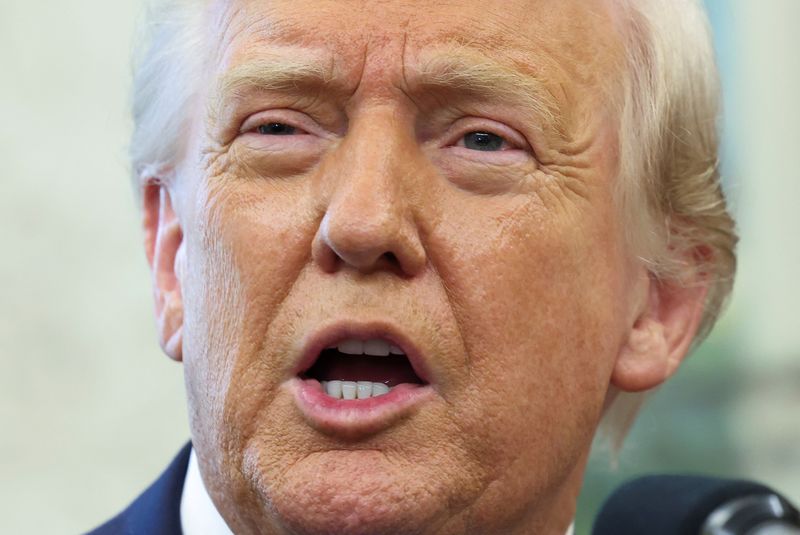
U.S. President Donald Trump said on Wednesday he will not consider lowering his steep, 145% trade tariffs on China, even as his administration prepares to engage in trade negotiations with Beijing.
Trump answered “no” when asked by a reporter at the White House if he was willing to scale back his tariffs to bring China to the negotiating table.
Trump’s comment comes just days before Treasury Secretary Scott Bessent and Trade Representative Jamieson Greer will meet their Chinese counterparts in Switzerland for trade talks.
Chinese officials said the meeting was taking place on Washington’s request, and that Beijing remained opposed to Trump’s tariffs.
Trump had earlier this week said he had no immediate plans to sign any trade deals, as his administration negotiates with several major trading partners, who face his reciprocal tariffs.
Washington announced on Tuesday that talks with China will take place in Switzerland. Although officials are expected to discuss trade, investors were doubtful that any progress would come from the meetings, given that both Washington and Beijing have struck largely hawkish stances over their recent tariff exchange.
China had imposed 125% tariffs on American goods in retaliation to Trump, and had signalled little intent to negotiate until Trump brought down his levies.
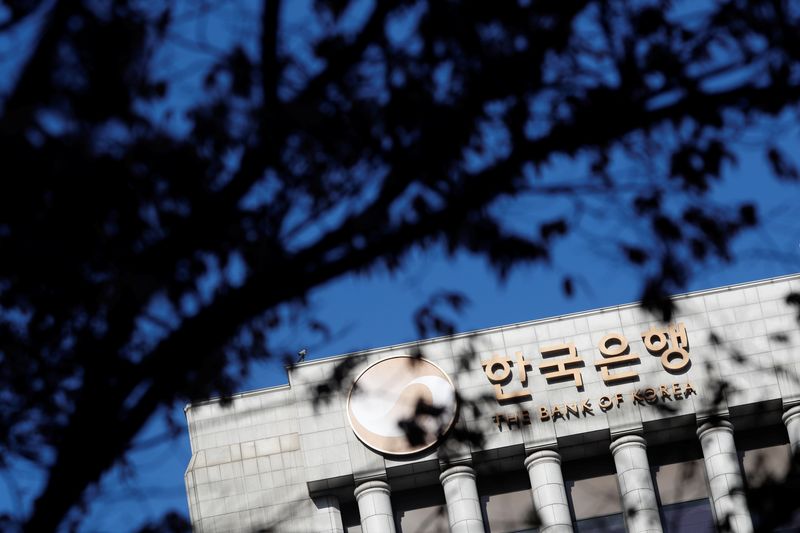
SEOUL (Reuters) -Most of the Bank of Korea’s board members assessed headwinds to South Korea’s economy were growing faster than expected, a factor that would warrant more interest rate cuts, minutes from last month’s meeting showed on Wednesday.
"With economic growth this year expected to fall short of previous forecasts due to the economic slowdown, the need for preemptive interest rate cuts is growing," one of the seven board members said, according to the minutes from the bank’s April 17 rate review.
The BOK’s seven-member board on April 17 held the benchmark interest rate at 2.75% as expected at its monetary policy review and signaled it would cut rates in May to cope with "significant" risks to the economy from U.S. President Donald Trump’s sweeping tariff policy.
A majority of economists surveyed by Reuters expect the BOK to lower the benchmark interest rate to 2.25% by the end of the third quarter of this year as shifting U.S. tariff policy fuels fears of a global recession and threatens to sharply curtail exports out of Asia’s fourth-largest economy.
The BOK next reviews policy interest rates on May 29.
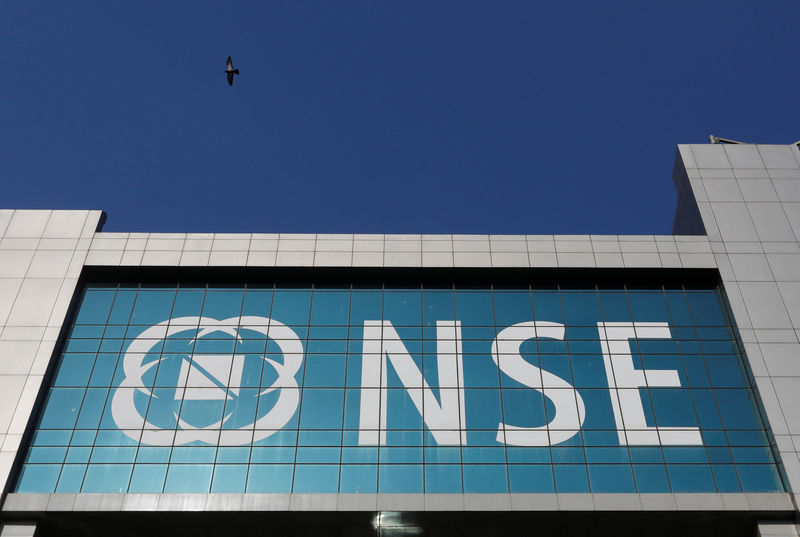
Indian stocks flitted in a flat-to-low range in early trade on Wednesday as investors grappled with a military escalation against Pakistan, while positive signals on U.S.-China trade talks offered some support.
The Nifty 50 benchmark rose 0.1% to 24,508.0 points by 09:44 IST (04:14 GMT), while the BSE Sensex 30 rose 0.2% to 80,782.40 points. Both indexes had opened lower, even as Gift Nifty 50 Futures pointed to a positive open.
India carried out strikes against nine alleged terrorist targets in Pakistan in the early hours of Wednesday, which it said were in retaliation for a deadly terrorist attack in Indian Kashmir in April.
Pakistan decried the move, retaliating with artillery strikes along the border in Kashmir, and also claimed to have shot down at least three Indian planes.
The strikes represented the worst fighting between the two nuclear armed nations in decades, leaving investors on edge over an escalation in tensions.
Still, bigger losses in Indian shares were limited by cheer over U.S.-China trade talks, which lifted broader Asian markets. U.S. and Chinese officials will meet for trade negotiations in Switzerland later this week, the two countries said on Tuesday.
Tata Motors Ltd (NSE:TAMO) (NYSE:TTM) was also a major supporter of the Nifty, rising nearly 3% after shareholders approved a plan where the company will split into two listed entities. The stock was the biggest gainer on the Nifty.
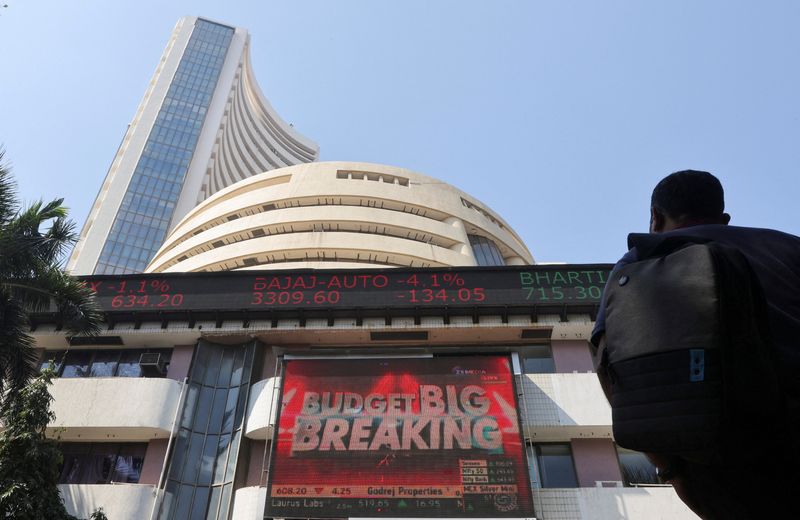
Most Asian stocks rose on Wednesday, with Chinese markets in the lead after the announcement of trade talks with the U.S. pushed up hopes for a deescalation in an ongoing trade war.
Other markets were less upbeat, with Indian stocks squarely in focus after a military escalation with neighbor Pakistan earlier in the day. Indian stock futures, however, pointed to a positive open.
Regional markets took a negative lead-in from Wall Street, which closed lower overnight after U.S. President Donald Trump signaled he was in no hurry to sign any trade deals. But U.S. stock index futures rose in Asian trade after the announcement of trade talks with China, with S&P 500 Futures adding 0.6%.
Sentiment was also testy before the conclusion of a Federal Reserve meeting later on Wednesday, where the central bank is widely expected to keep rates steady and signal no changes in the near-term.
Chinese stocks rise, Hong Kong rallies on trade talk cheer
China’s Shanghai Shenzhen CSI 300 and Shanghai Composite indexes added about 0.5% each, while Hong Kong’s Hang Seng blew past its regional peers with a 1.5% rise.
U.S. Treasury Secretary Scott Bessent and Trade Representative Jamieson Greer will meet their Chinese counterparts for trade talks when they travel to Switzerland this week, their respective offices said late-Tuesday.
The announcement marks the clearest signal yet on trade negotiations between Beijing and Washington, after officials from both sides signaled some openness to talks last week.
But whether this will result in immediate deescalation still remains to be seen, especially as Trump signaled he was in no hurry to sign a trade deal with any country.
Steep trade tariffs between the two countries– following an escalation in their trade war in April– still remained in place. A swathe of recent economic readings also showed both the U.S. and China were facing headwinds from the trade conflict.
Chinese markets were also encouraged by the People’s Bank cutting a key reserve requirement ratio for local banks, which heralds more monetary stimulus for the economy.
Indian stocks set for strong open despite Pakistan military escalation
India’s Gift Nifty 50 Futures rose 0.5% in morning trade, heralding a positive open for the Nifty 50 even as tensions with Pakistan rose substantially on Wednesday.
India said it had carried out strikes against alleged terrorist encampments in Pakistan early on Wednesday, while Islamabad claimed to have retaliated with artillery strikes, and had also shot down five Indian planes.
The spike in tensions between the two nuclear armed countries comes after a deadly terrorist attack in India’s Kashmir region last month, which New Delhi blamed on Pakistan.
The renewed tensions represent the worst fighting between the two countries in over two decades, leaving investors on edge over a worsening in tensions. Indian stocks were also nursing losses in recent weeks on fears of an escalation.
Broader Asian stocks were mildly higher, with investors also skittish before the conclusion of a Fed meeting later in the day.
Australia’s ASX 200 index rose 0.2%, while South Korea’s KOSPI added 0.4%.
Japan’s Nikkei 225 index rose 0.3%, while the TOPIX index added 0.4%.
Singapore’s Straits Times index shed 0.2%, weighed chiefly by losses in major bank UOB (SGX:UOBH), after it clocked softer-than-expected quarterly earnings.

